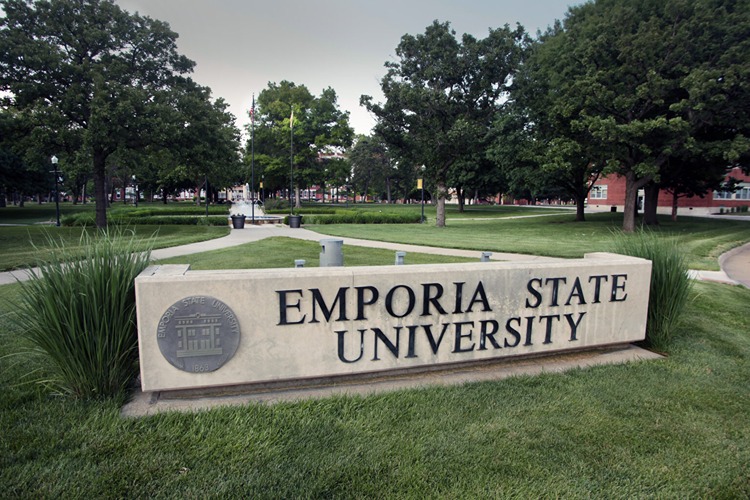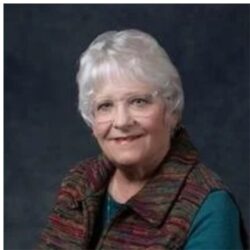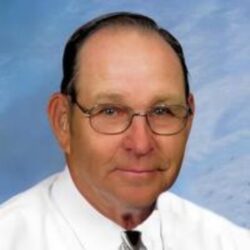
By Sam Bailey, Kansas Reflector
TOPEKA, Kan. — Emporia State University has asked a district court judge to review and reverse the reinstatement of five professors fired last year as part of a university-wide restructuring.
The Office of Administrative Hearings ordered the reversal of the terminations of Amanda Miracle, Robert Catlett, Michael Behrens, Lynette Sievert and Dan Colson because the university failed to provide a specific reason for firing them. ESU responded with petitions in Lyon County District Court seeking to reverse the OAH orders and rule in favor of the university.
“It was kind of a short-lived victory, I guess, in that we then have to go to district court,” said Sievert, a professor of biological sciences. “They’re appealing the fact that we won.”
In October 2022, ESU and the OAH signed an interagency agreement outlining the appeals assignments and service agreements. Kansas Reflector obtained a copy of the contract, which shows ESU agreed to pay a service bill of $115 per hour for OAH services.
Gwen Larson, spokeswoman for ESU, said the university has not yet received any billing statements from the OAH so she does not know the cost of the hearings. OAH didn’t immediately respond to a Kansas Open Records Act request for related documents.
Four additional professors who appealed their terminations are still waiting for decisions on their cases, and two other professors’ terminations were affirmed by OAH.
The university informed some of the professors they were being placed on administrative leave and told them to clear out their offices at the end of the school year.
Appealing termination
ESU president Ken Hush went before the Kansas Board of Regents in September 2022 to adopt the Framework for Workforce Management, a document allowing the termination of professors on campus regardless of their tenure status. The next day, the university fired 33 faculty members, effective May 16.
“Honestly, I did not think what they did could be done,” Sievert said. “It was such a shock, because I thought tenure actually meant something, not that people could come along and just say, well, we’re going to ignore it for a little while.”
A spokesman for KBOR did not respond to a request for an interview.
As outlined in the framework, the fired faculty members had 30 days to file an appeal to OAH. Once the administrative officer assigned to a professor’s case decided on the appeal, the ruling would be final and neither KBOR nor the university could appeal the case. However, state law allows the university or employee to seek judicial review of the administrative officer’s legal reasoning.
“An appeal under this policy will not stay the effective date of the suspension, dismissal, or termination,” read the last section of the framework. “An employee who wins their appeal will be entitled to reinstatement, back pay and restoration of other lost benefits.”
Larson objected to Kansas Reflector’s use of the word “reinstated” to describe faculty members who won their appeal. Larson said the final decision regarding the status of the professors has not been made, despite the terminations being “reversed” through the appeals decisions.
“We’re not really using the term reinstatement,” Larson said. “I know that that is the easiest description for what it looks like happened with some of those wage decisions, but essentially, what some of those decisions said is that the administrative judge ruled that we did not follow our procedure to terminate these appointments. That does not necessarily give a person their position back.”
If a Lyon County District Court judge upholds the decision made by OAH, the university may file additional legal action. If the judge disagrees with the decision to reverse the termination, the case may be sent back to OAH for reconsideration.
Jess Mack, legal assistant for OAH, said the university filing the petition is standard and all decisions made by the office are subject to appeal.
Four professors who appealed their terminations are still waiting for rulings from OAH, months after the appeals began.
Three of the appealing professors decided to drop their appeals and retire. Factors that may have contributed to their decisions include unused sick leave that is not available after being fired, the possibility of teaching as an adjunct professor, eligibility for emeritus status, and financial strain through the continual appeals process.
The OAH officers affirmed the decisions to terminate two professors, Christopher Lovett and Sheryl Lidzy, because the university provided explanations for their dismissals, as required by the framework policy adopted by KBOR. Lovett and Lidzy have been removed from the university directory.
‘Unfit to lead’
The American Association of University Professors found KBOR members and ESU administrators “unfit to lead” following a monthslong investigation into the university’s restructuring and firing of tenured professors.
ESU is the only Kansas institution to be censured by the AAUP and is one of three U.S. institutions censured in 2023.
The investigative report was released May 1, just days after ESU announced its plan to restructure the university into large schools, eliminating departments and department chairs.
Michael Smith, a political science professor and former chairman of the department of social sciences, sociology and criminology, said he was notified via email at 1 p.m. the day grades were due for the spring semester that his duties as chairman of the department would conclude at 5 p.m. that afternoon.
When asked if Smith was the only department chair asked to step down before the end of the fiscal year, Larson said ESU does not comment on personnel-related matters.
Smith said that while he is grateful he is still getting paid as a department chairman through the end of the fiscal year, he doesn’t understand the university’s rush. One of his duties as chairman was to file the assessment report on the previous year that reviews the learning outcomes of the program and uses assessment data in order to determine how well those outcomes were achieved. Based on the findings, recommendations for the following year are offered.
Larson said the reports will still be completed through the restructuring.
The assessment report is critical for the Higher Learning Commission accreditation, Smith said.
Accreditation “validates the quality” of an institution’s academic programs and instruction at all degree levels, according to the HLC website. A degree from an unaccredited institution is not transferable to other institutions.
ESU is scheduled for its 10-year comprehensive evaluation to reaffirm accreditation by HLC in 2024-25, said Laura Janota, HLC spokeswoman. The university will host a visit from reviewers in fall 2024.
The AAUP finding ESU administration unfit to lead will be a consideration in the HLC evaluation, said Ron Barrett-Gonzalez, a Kansas AAUP committee officer.
“If the institution loses accreditation, then essentially the degree from ESU would become worthless,” Barrett-Gonzalez said. “So right now, in many ways, the AAUP censure is the canary in the coal mine, and the canary has basically died.”
What has happened at ESU was “brutal to teachers,” Barrett-Gonzalez said.
ESU was listed as one of the 10 worst colleges for free speech in February by The Foundation for Individual Rights and Expression.
Smith said he has entered the job market and is hoping to find an institution that is not censured by AAUP and values free speech where he can continue working in academia.
“I love being chair and would have been happy to continue doing that, or I’d like to be maybe a different kind of administrator,” Smith said. “The glitch there is since I’m strongly opposed to ESU’s new direction, I don’t see any role for me there, and so it becomes a question of looking to do that role at another school.”






















